Sloviansk mayor urges residents to flee city
The mayor of Sloviansk has called on its remaining residents to evacuate as the Russian invaders stepped up their shelling of the frontline Ukrainian city following the capture of Lysychansk on Sunday, Dan Sabbagh and Lorenzo Tondo report.
Vadim Lyakh said 40 houses had been shelled on Monday, a day after six people were killed and 20 injured in missile attacks aimed at one of the main population centres in the Donbas still outside Russian control.
“It’s important to evacuate as many people as possible,” Lyakh said in an interview with Reuters, noting that 144 people had been evacuated on Tuesday, including 20 children, from a city now deemed at risk from Russian bombardment.
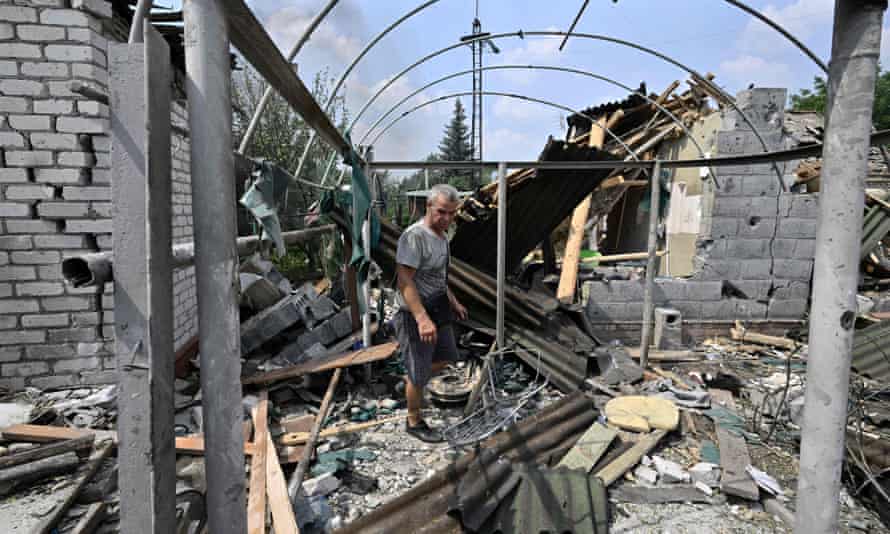
Russia had concentrated its forces to capture the cities of Lysychansk and Sievierodonetsk between May and July, the last two cities in Luhansk province it did not control, through an unrelenting and often untargeted artillery barrage.
Ukraine said on Monday it had retreated from Lysychansk, prompting speculation that Russia would now focus on Sloviansk and Kramatorsk to the south, the two main cities in Donetsk held by Kyiv. The provinces of Luhansk and Donetsk make up Ukraine’s industrial Donbas region.
Sloviansk had a population of 107,000 and Kramatorsk 210,000 before the war. Despite the threat of a Russian attack, thousands had remained, reluctant to abandon their homes despite being just a few miles from the frontlines.
It is unclear if Moscow will immediately attempt to seize Sloviansk. The Russian president, Vladimir Putin, said on Monday that Russian troops who fought in Luhansk needed to “take some rest and beef up their combat capability”.
Key events:

Patrick Wintour
Ukrainian plans to seize as much as $500bn (£418bn) in frozen Russian assets to fund the country’s recovery have met firm resistance from Switzerland, the hosts of an international two-day Ukraine recovery conference.
The Swiss president, Ignazio Cassis, pushed back on the plan, saying protection of property rights was fundamental in a liberal democracy. He underlined at a closing press conference the serious qualms of some leaders that proposals to confiscate Russian assets will set a dangerous precedent and needed specific legal justification.
“The right of ownership, the right of property is a fundamental right, a human right,” he said in Lugano, adding that such rights could be violated, as they had during the pandemic, but only so long as there was a legal basis.
He added: “You have to ensure the citizens are protected against the power of the state. This is what we call liberal democracies.”
Switzerland is one of many countries with tight banking secrecy laws that is not enthusiastic about seizing private property for political purposes.
The idea has won the endorsement, in principle, of the UK foreign secretary, Liz Truss.
Russia’s defence minister, Sergei Shoigu, has claimed some of the weapons the west is sending to Ukraine are ending up on the black market.
Shoigu said Ukraine had received more than 28,000 tonnes of military cargo so far, and some of the weapons were appearing in the Middle East. He did not provide any details to back up his claim.
Speaking in televised remarks, Shoigu said:
According to information at our disposal, some of the foreign weapons supplied by the west to Ukraine are spreading across the Middle Eastern region and are also ending up on the black market.
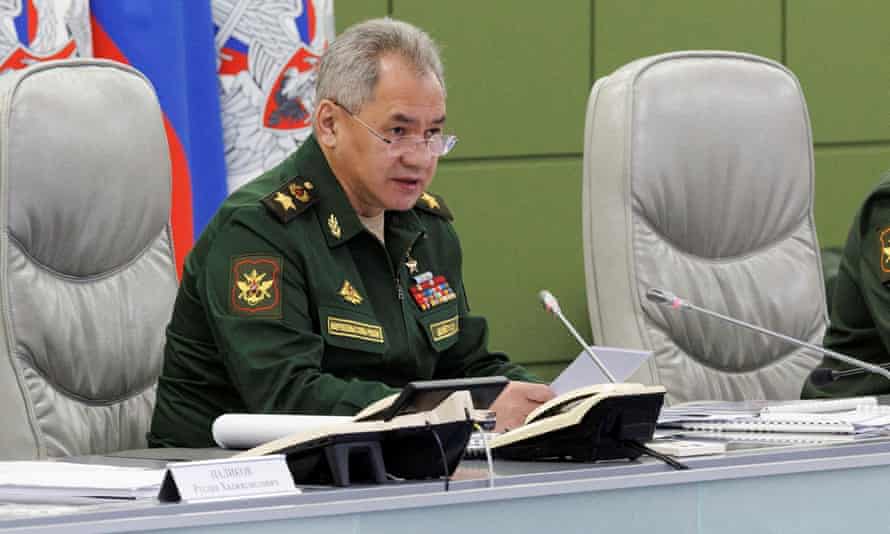
Sloviansk mayor urges residents to flee city
The mayor of Sloviansk has called on its remaining residents to evacuate as the Russian invaders stepped up their shelling of the frontline Ukrainian city following the capture of Lysychansk on Sunday, Dan Sabbagh and Lorenzo Tondo report.
Vadim Lyakh said 40 houses had been shelled on Monday, a day after six people were killed and 20 injured in missile attacks aimed at one of the main population centres in the Donbas still outside Russian control.
“It’s important to evacuate as many people as possible,” Lyakh said in an interview with Reuters, noting that 144 people had been evacuated on Tuesday, including 20 children, from a city now deemed at risk from Russian bombardment.

Russia had concentrated its forces to capture the cities of Lysychansk and Sievierodonetsk between May and July, the last two cities in Luhansk province it did not control, through an unrelenting and often untargeted artillery barrage.
Ukraine said on Monday it had retreated from Lysychansk, prompting speculation that Russia would now focus on Sloviansk and Kramatorsk to the south, the two main cities in Donetsk held by Kyiv. The provinces of Luhansk and Donetsk make up Ukraine’s industrial Donbas region.
Sloviansk had a population of 107,000 and Kramatorsk 210,000 before the war. Despite the threat of a Russian attack, thousands had remained, reluctant to abandon their homes despite being just a few miles from the frontlines.
It is unclear if Moscow will immediately attempt to seize Sloviansk. The Russian president, Vladimir Putin, said on Monday that Russian troops who fought in Luhansk needed to “take some rest and beef up their combat capability”.
Here are some of the latest images to be sent to us from Ukraine over the newswires.
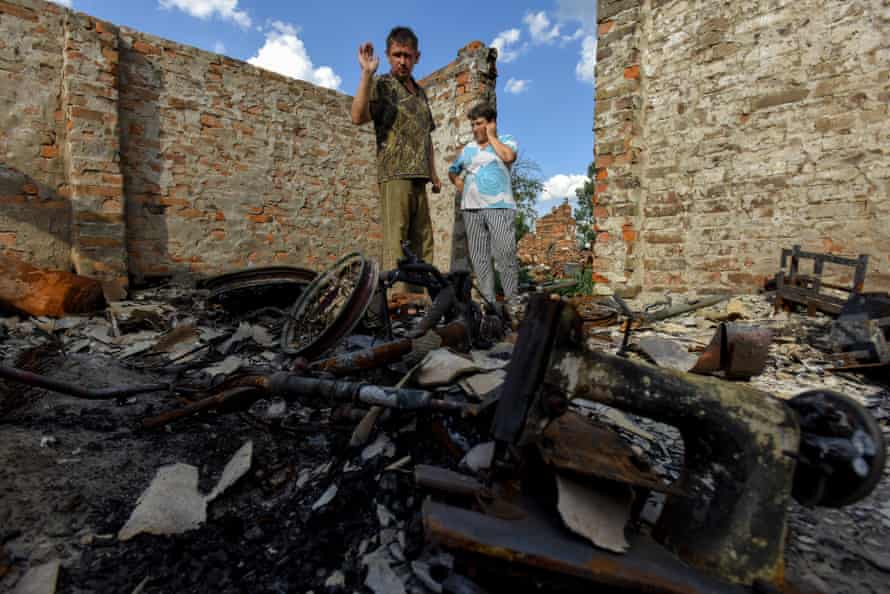
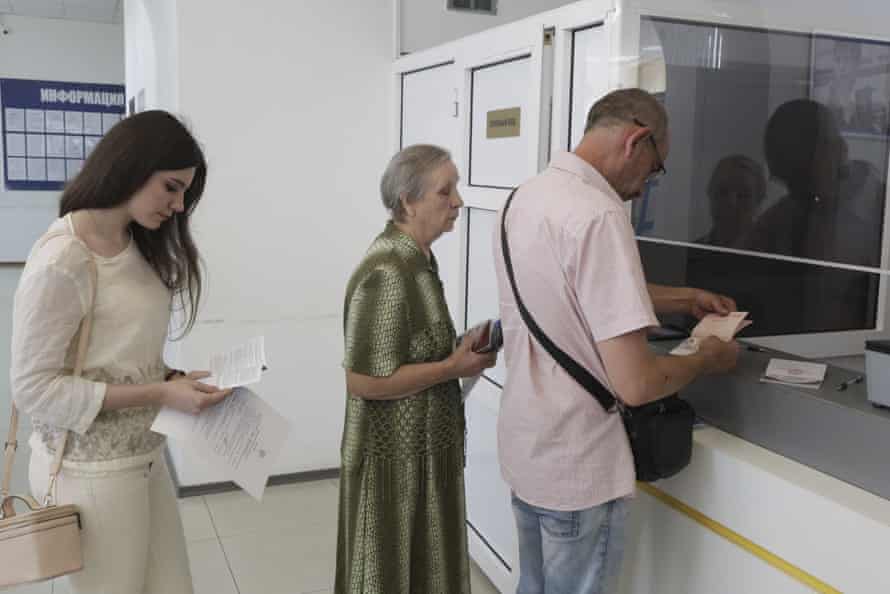
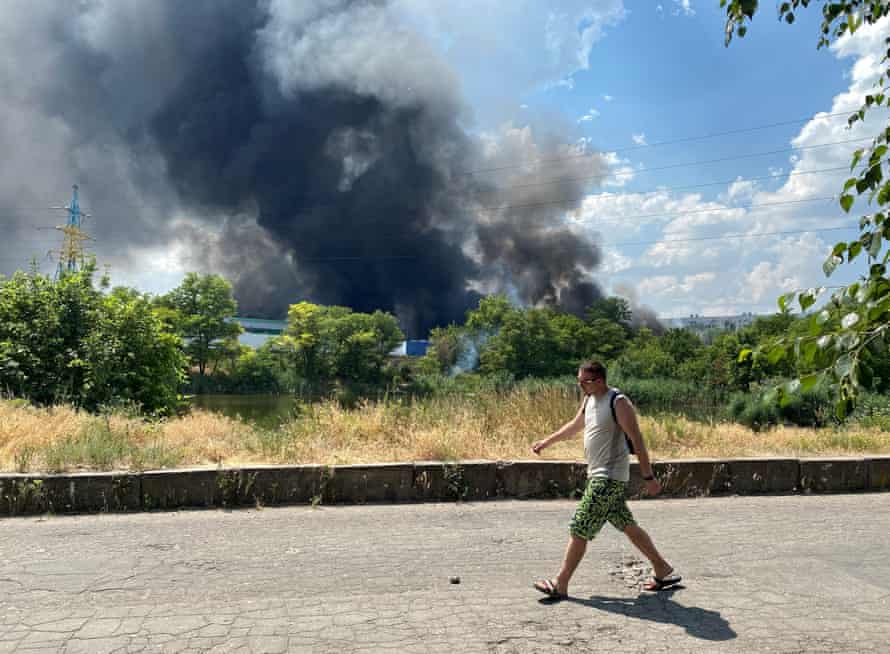
Ukraine’s ministry for foreign affairs has called for the exclusion of Russian cosmonauts from future International Space Station (ISS) missions. It comes in the wake of the three Russians onboard the ISS appearing to display the flags of the self-proclaimed Donetsk People’s Republic and Luhansk People’s Republic.
Oleg Nikolenko, spokesperson for the ministry, tweeted:
Russian cosmonauts display on ISS a flag under which Russian troops kill women and children in Donbas and turn entire Ukrainian cities to ashes. Russia is exporting its barbarism even to space – a zone of peace. It must be barred from all international space programs.
Russian cosmonauts display on @Space_Station a flag under which Russian troops kill women and children in Donbas and turn entire Ukrainian cities to ashes. Russia is exporting its barbarism even to space – a zone of peace. It must be barred from all international space programs. pic.twitter.com/jn6iXIliqw
— Oleg Nikolenko (@OlegNikolenko_) July 5, 2022
Some observers have questioned the veracity of the photo. It appears to show the same three cosmonauts – Oleg Artemyev, Denis Matveyev and Sergey Korsakov – who were lauded for wearing yellow and blue uniforms in Ukraine colours shortly after Russia’s latest invasion of its neighbour began in February, now expressly supporting the breakaway regions that Russia is occupying. The image was released by the official Roscosmos Telegram channel yesterday, in the wake of Russia declaring it had successfully occupied all of Luhansk.
Only 3% of Mariupol residents have access to water, according to the Russian-occupied southern Ukrainian city’s mayoral adviser, Petro Andriushchenko.
Residents are being forced to take water everywhere, “including sewage wells”, Andriushchenko said.
There are no doctors left in the city, he said, leaving more than 100,000 people without healthcare and medication.
From Ukrainian activist Olena Halushka:
#Mariupol mayor’s advisor Andryushchenko informs there are no doctors there anymore. The last 17 russians have just left. More than 100k ppl incl kids are left w/o healthcare or medications, in town w no drinking water & amidst many chaotic burials. Let alone the heat. Terrifying
— Olena Halushka (@OlenaHalushka) July 5, 2022
At least one person has died and three people were wounded after Russian forces struck a market in the eastern Ukrainian city of Sloviansk in the Donetsk region, according to police.
Yellow smoke was seen billowing up from an auto supplies shop, and flames engulfed rows of market stalls as firefighters tried to extinguish the blaze, Reuters reports.
It was not clear how many people were at the market at the time of the attack, police said, but the market had been in the process of closing for the day and some shops were still open.
Ukraine’s president, Volodymyr Zelenskiy, has said he held further talks with Britain’s prime minister, Boris Johnson, about the latest situation in Ukraine.
The call between the two leaders came as Johnson faces mounting pressure over his decision to appoint the former Conservative deputy chief whip, Chris Pincher, who resigned last week over allegations he groped two men at a private members’ club in London.
Held talks with @BorisJohnson. Thanked for the unwavering support of ?? – the recent decision to provide £1 billion in security aid and today’s – £100 million. Talked about food security for the world and security guarantees for ??. Grateful for ??’s willingness to host #URC2023
— Володимир Зеленський (@ZelenskyyUa) July 5, 2022
As our Andrew Sparrow writes, calls between Johnson and Zelenskiy appear to be a regular occurrence. Amazingly, such calls often seem to coincide with days when the UK prime minister is facing some sort of domestic turmoil in London.
Russia’s parliament has approved the first stage of laws that would allow the country to move to a war economy.
The two bills would authorise the government to oblige businesses to supply the military with goods and their employees to work overtime to support Russia’s invasion of Ukraine, Reuters reports.
The military needed to be supported at a time when the Russian economy is under “colossal sanctions pressure” from the west, deputy prime minister Yuri Borisov told parliament.
Both bills need to undergo second and third readings, be reviewed by the upper house of parliament and be signed by President Vladimir Putin to become law.
Meanwhile, the speaker of the lower house of Russia’s parliament, Vyacheslav Volodin, told members in a plenary today that Ukraine had become a “terrorist state”.
According to remarks posted on the State Duma’s website, Volodin accused the Ukrainian leader, Volodymyr Zelenskiy, of being the head of a “criminal regime”.
Turkey seizes Russian ship carrying ‘stolen’ Ukrainian grain
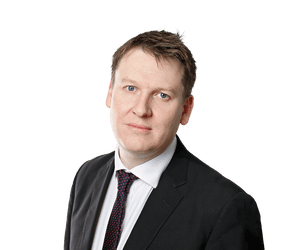
Daniel Boffey
A Russian-flagged ship carrying thousands of tonnes of grain is being held and investigated by Turkish authorities in the Black Sea port of Karasu over claims its cargo was stolen from Ukraine.
Turkish customs officials acted after Kyiv claimed the Zhibek Zholy was illegally transporting 7,000 tonnes of grain out of Russian-occupied Berdyansk, a Ukrainian port in the south-east of the country.
Officials in Karasu said the ship was waiting off port while inquiries were undertaken into the provenance of the shipment.
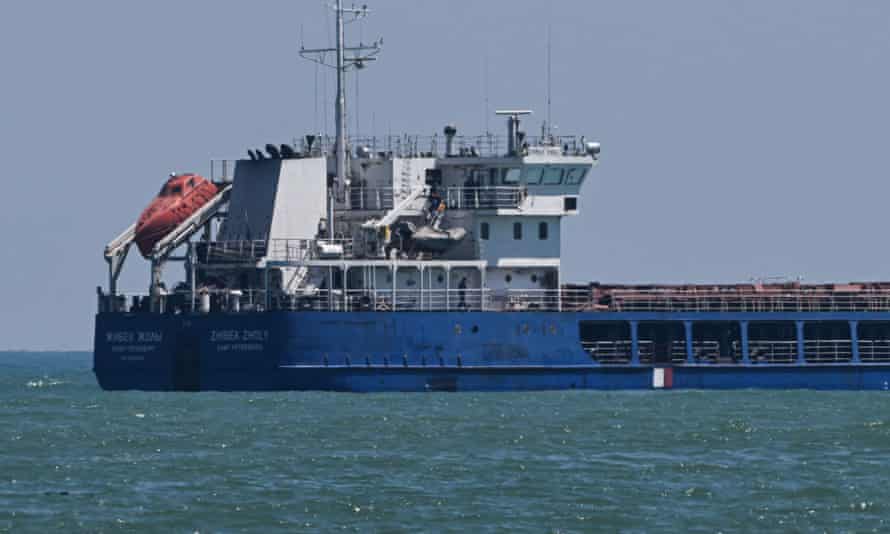
Russia’s foreign minister, Sergei Lavrov, confirmed that the ship was Russian-flagged, but appeared to muddy the waters while claiming the Kremlin was seeking clarity on Monday.
“The ship really is Russian-flagged, but I think it belongs to Kazakhstan and the cargo was being carried on a contract between Estonia and Turkey,” Lavrov told reporters.
Kyiv has accused Russia of stealing grain from occupied Ukrainian territory to sell on the international markets. The country’s grain exports are responsible for almost 15% of the world’s total.
The case of the Zhibek Zholy has brought claims of theft into sharp focus and put the Turkish government in a sensitive position as it continues to seek a mediating role between Moscow and Kyiv over the issue of global food supply.
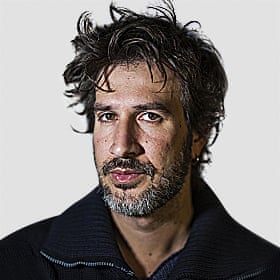
Lorenzo Tondo
Our Lorenzo Tondo has tweeted an image from Mykolaiv, where local officials said several Russian missiles struck the southern Ukrainian city last week.
A Ukrainian mathematician who proved the best way to pack spheres in eight dimensions to take up the least space, and an Oxford expert who has solved conundrums in the spacing of prime numbers, are among the winners of the Fields medal, considered the equivalent of a Nobel prize for mathematics.
The winners of the prize, presented at the International Mathematical Union awards ceremony in Helsinki, have been announced as Prof James Maynard 37, from Oxford University, Prof Maryna Viazovska, 37, of the École polytechnique fédérale de Lausanne, Hugo Duminil-Copin, 36, of the University of Geneva and Institut des Hautes Études Scientifiques, and June Huh, 39, of Princeton University.
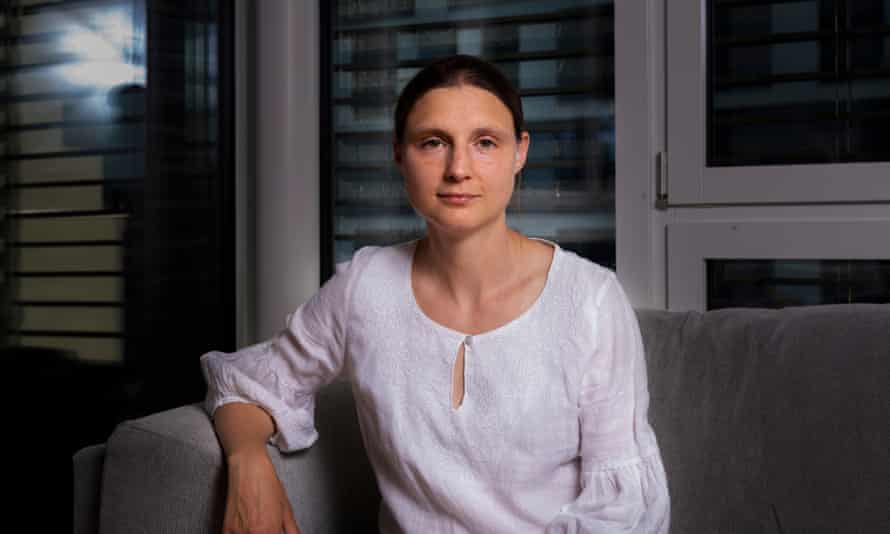
While the first Fields medal was awarded in 1936, there was a hiatus until 1950, since when it has been presented every four years to up to four mathematicians who are under 40.
Viazovska, who was born and grew up in Kyiv, is only the second woman to receive the award, after the win by Iranian mathematician Maryam Mirzakhani, who became a medalist in 2014. Mirzzakhani died of breast cancer in 2017.
Russian conscripts are not being sent to fight in Moscow’s “special military operation” in Ukraine, defence minister Sergei Shoigu claimed.
President Vladimir Putin has repeatedly denied Russia uses conscripts drafted by the state to serve in the army, saying only professional soldiers and officers are taking part in its military operation.
Last month, about a dozen army officers were prosecuted after the defence ministry admitted that hundreds of conscripts were sent to fight in Ukraine.
Citing Putin spokesperson Dmitry Peskov, the Russian state-owned news agency Ria reported that Putin had ordered military prosecutors to investigate and punish the officials responsible for disobeying his instructions to exclude conscripts from the operation.
The defence ministry said in March:
Unfortunately, we have discovered several facts of the presence of conscripts in units taking part in the special military operation in Ukraine. Practically all such soldiers have been pulled out to Russia.
Finland and Sweden sign ‘historic’ Nato accession protocol
The 30 Nato member countries have signed accession protocols for Finland and Sweden, sending the membership bids of the two Nordic countries to allied parliaments for approval.
The protocol means Finland and Sweden can join in Nato meetings and have greater access to intelligence, but will not be protected by an alliance defence clause – that an attack on one ally is an attack against all – until ratification.
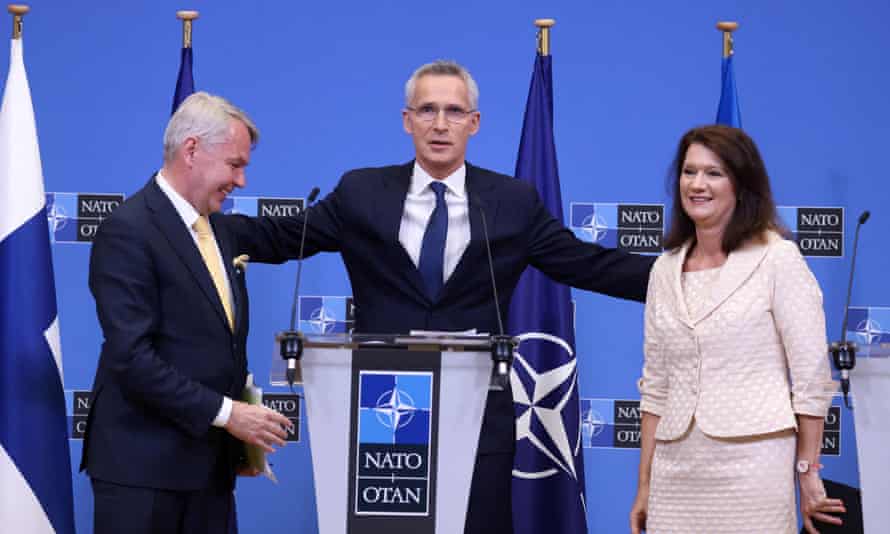
Nato’s secretary general, Jens Stoltenberg, said at the signing at Nato headquarters alongside the Finnish and Swedish foreign ministers:
This is truly an historic moment. With 32 nations around the table, we will be even stronger.
He urged allies to swiftly ratify and assured the two Nordic countries of Nato’s support in the meantime.
Sweden’s foreign minister, Ann Linde, thanked Nato for its support and said she was looking forward to working together “in ensuring our collective security”.
Just took part in historic NAC meeting where ?? and ?? accession protocols were signed by all NATO allies. Thank you for your support! Now the process of ratification by each of the Allies begins. Look forward to working together in ensuring our collective security. #WeAreNATO pic.twitter.com/9VNyBwk0Es
— Ann Linde (@AnnLinde) July 5, 2022
Russia has repeatedly warned both countries against joining Nato, and in March threatened “serious military and political consequences” should Finland and Sweden join the alliance.
Hello everyone. It’s Léonie Chao-Fong here again, taking over the live blog from Martin Belam to bring you all the latest from the war in Ukraine. Feel free to drop me a message if you have anything to flag, you can reach me on Twitter or via email.
